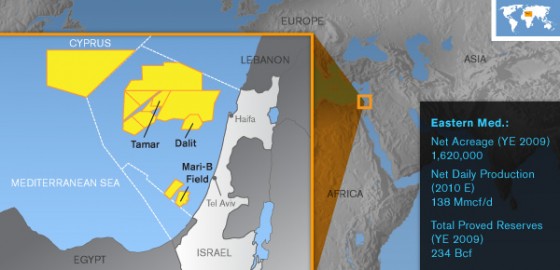 Natural gas fields off Israel’s coast. A submerged gas pipeline to Greece will be even more ecologically problematic.
Natural gas fields off Israel’s coast. A submerged gas pipeline to Greece will be even more ecologically problematic.
Israel is considering a plan to build an underwater natural gas pipeline to Europe as a way to transport gas being drilled from offshore wells in the eastern Mediterranean. The plan, as reported August 30 in Globes, involves a pipeline that will run from the Tamar and Dalit gas fields, located off Israel’s northern coastline, and along the seabed to Greece where it will then be transported overland to various EU countries. The undersea gas fields are currently being developed by a drilling consortium involving the American Nobel Energy Inc., based in Houston Texas, and the Israeli Delek Group Ltd., controlled by business tycoon Yitzhak Tshuva.
 The gas fields have been mentioned previously, particularly regarding the potential environmental dangers they pose to the already endangered Mediterranean Sea. Running an undersea gas pipeline is a very challenging engineering endeavor; the environmental aspects are only part of the issues involved.
The gas fields have been mentioned previously, particularly regarding the potential environmental dangers they pose to the already endangered Mediterranean Sea. Running an undersea gas pipeline is a very challenging engineering endeavor; the environmental aspects are only part of the issues involved.
Israel’s northern neighbor, Lebanon, now under the increasing influence of Hezbollah, is challenging Israel’s claim of ownership in these gas fields and has brought the issue to the attention of the UN General Assembly.
Assuming that the political issues surrounding the gas fields can be worked out between the two countries, the ecological dangers of such a pipeline in any marine environment are already well known, and in Lebanon, corruption often jeopardizes its normal political functions, including environmental matters.
Even surface gas pipelines are subject to explosions and other damage due to leaks and tampering. Then of course there are the dangers of undersea quakes, as the eastern Mediterranean straddles one the world’s major geological fault lines.
According to Globes, Israel hopes that by exporting natural gas to Europe, the country’s geopolitical standing with the EU will improve: this will give European countries an energy alternative to dependence on natural gas from Russia, and the “Russian government’s muscle-flexing and willingness to cut off gas supplies to countries that do not accept its diktats.”
Channeling the pipeline to Greece will also indicate a shift of Israel’s relations to that country as a result of the increasing deterioration of Israel’s relations with Turkey.
Putting political implications aside, the environmental dangers to the Mediterranean are still the main issues here, and running an undersea natural gas pipeline along 1201.6 Kilometers or 648.4 Nautical Miles of Mediterranean seabed is enough of an ecological worry to keep oceanographers and marine biologists up nights for years to come.
Images: Noble Energy Inc.
Read more about eastern Mediterranean gas fields:
Tshuva’s Yam Tethys Gas Company Wins, but Environment Loses
Discovery by Israel of Natural Gas is a World Class Game Changer
UN to Mediate Natural Gas Standoff Between Israel and Lebanon



Excuse me, Steve, but i don’t think you fully read – and comprehended the article. There are a number of dangers to an undersea natural gas pipeline, as noted in the article. These include:
1. Leakage or even bursting of the pipe or fittings where pipes are jointed together resulting in anything from mild to serious pollution (especially in the case of a burst pipe due to too much gas pressure).
2. Damage from natural causes such as earthquakes, which happen occasionally in this part of the Mediterranean. This could result in a severe case of pollution as the amount of damaged pipeline could be considerable.
3. Sabatoge from terrorists like Hezbollah, or even direct military action from either Lebanon or Syria.
4. Problems in repairing a damaged segment of pipeline as occurred in the recent oil spill in the Gulf of Mexico. Parts of the Mediterranean are very deep, resulting in tremendous undersea pressures on the pipeline. The case of the Deepwater Horizon well has become a classic example of how difficult it can be to repair equipment located at great depths.
I hope I have answered your question.
I still haven’t heard exactly what are the dangers besides the general concerns that I can fully appreciate. But existential angst of a pipeline is not the same as real danger. Please share exactly what are those concerns.
Thanks,
Steve Ornstein